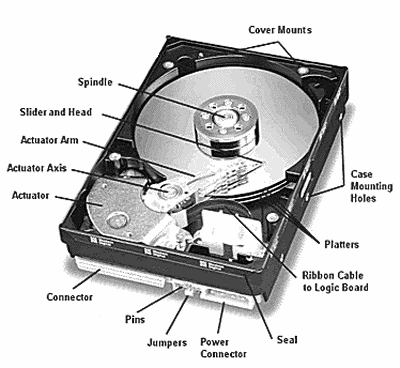Hard Drive Failure
A common problem with a computer system is hard drive / hard disk failure. Since the Personal Computer platform was introduced with internal hard drives, users have been encouraged to create backups of important data. A hard drive is a form of non volatile storage, however, any hard disk drive will inevitably failure. Failure may occur over time in the form of increasing bad sectors, or failure may be catastrophic and sudden.
The hard drive in your personal computer is a mechanical device, with precision moving parts guided by electronics. Data is stored on rotating disks with magnetic surfaces called platters. As the platters rotate rapidly, the read-write heads of the hard drive are used to write and read the information stored on the surface of one or more disk platters. These drives operate at amazing speed which produces plenty of stress on the parts. Through normal use the stress will eventually result in failure.
Hard Drive Failure can be categorized by three types.
The modern personal computer hard drive has many internal parts.
In order to increase the amount of information the drive can store, most hard disks have multiple platters. The drive in the illustration has three platters and six read/write heads. Both the top and bottom of each platter surface is used for data storage. The mechanism that moves the arms on a hard disk is constructed using a high-speed linear brushless type motor.
When a hard drive starts to fail, there are often warning signs. It is important to notice these warning signs and get all of the important current data you can off of the drive before it becomes unusable.
The most common warning sign is sound. If your hard drive seems much louder than usual or makes clicking or grinding sounds, check it ASAP and be prepared to backup your data and replace the drive. If it seems much louder than usual or makes occasional clicks or grinding sounds, check it ASAP and be prepared to backup your data and replace the drive.
